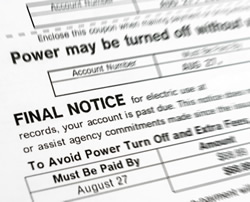Emily Stewart* says the COVID-19 pandemic has led to job losses and increasing levels of debt. Here’s how you can get on top of it.
 Are you one of the hundreds of thousands of Australians who are now unemployed — perhaps for the first time?
Are you one of the hundreds of thousands of Australians who are now unemployed — perhaps for the first time?
If you’ve got no money coming in, as well as no savings, life might be looking pretty grim right now.
But there are ways you can improve your financial situation.
The ABC’s Personal Finance team asked two financial counsellors from the independent and free National Debt Helpline about what steps to take next.
First, figure out how to get some money coming in
“A lot of people who are calling have never been in this situation before,” said Deb Shroot, a financial counsellor with Care.
“They’re feeling panic and don’t know what is available and what it means for them.”
“The first thing we normally discuss is how they’re going to get access to money.”
While many people try to find new jobs, they might also be eligible for government assistance.
The Federal Government has changed the criteria for Jobseeker and Youth Allowance so more people are eligible.
You might be eligible for the $550-per-fortnight coronavirus supplement, or the Jobkeeper allowance, if your workplace has signed up for it.
“Even if it takes a while to process, it will backdate to when they applied, so certainly earlier is always better,” Ms Shroot said.
And don’t forget to check whether you’re eligible for a concession card.
“That can provide other benefits such as discounts on utilities and, in some States, you might get discounts on rates and those sorts of essential services,” she said.
Next — dealing with your debts
The next step is to write a list of all your debts, says Sarah Brown-Shaw, a financial counsellor with the Consumer Action Law Centre.
“Literally go through one by one and contact all your banks and utilities companies, just to have some conversations letting them know you’re in hardship and asking what they are able to offer,” she said.
Ms Shroot said creditors might have different policies and might offer slightly different hardship arrangements.
“For example, with credit card debt, are they able to freeze the balance on their credit card or offer a moratorium with no interest and no fees?”
It’s always good to ask a bunch of questions so that you know what might happen, she suggested.
“Are there any penalties?”
“Is it interest free?”
“Are there any consequences?”
“Will it be a black mark on your credit rating?’
Then prioritise your debts.
“You need to keep a roof over your head, so I will always look at the housing situation as an absolute priority, and also food,” Ms Brown-Shaw said.
Most banks are offering a six-month deferral on your mortgage, which means you won’t have to make any principal or interest payments during that time.
But in some cases, interest will continue to add up and be added to the remainder of your loan.
But what if I can’t pay my rent?
Rental law is a State and Territory matter, so offers are different in each State.
But some include one-off payments.
“There’s some really good info on the Consumer Affairs and Tenants’ Union websites,” Ms Shroot said.
And soon States and Territories will be introducing a moratorium on evictions (which means you can’t be kicked out for the next six months) for people financially disadvantaged by COVID-19.
Although it sounds hard, the best thing to do is try to negotiate with your landlord or rental agency.
“Ask them if they’re able to reduce the rent,” Ms Shroot said.
“You need to be clear how long it would be for and what would happen if you did fall behind on your payments.”
For utility bills, you can also ask for hardship arrangements.
State and Territory leaders have also agreed that essential services like energy and water should not be cut off to customers struggling to pay their bills.
“Anyone that’s not having success negotiating with their utility provider, there is an Ombudsman scheme in every State,” Ms Brown-Shaw said.
“Anyone who is at risk of being disconnected and not having much success with their utility provider, we’d just be sending them straight to the Ombudsman.”
“The Ombudsman can prevent the disconnection from happening so that’s a real safety net for people.”
Should I access my super early?
The Federal Government has now made this option possible.
You can pull out up to $10,000 this financial year, and a further $10,000 next financial year.
But Ms Shroot warns it should only be used as a last resort.
“I think they should look at all other hardship options first, because there are obviously consequences to early release of super,” she said.
“If you’re withdrawing it now it might be worth a bit less than what was a few months ago because the stock market has fallen.”
And you also miss out on the benefits of compound interest (interest on the interest you earn), which accrues over time.
“The negative consequences are things like, if you’re in your thirties and you take $10,000 out of your super, you’re effectively taking about $80,000 from your future retirement fund,” she said.
“But people have to eat, they’ve got kids and families to look after and I get that.”
“At the end of the day it’s their choice.”
And if you need help, just ask.
“I think the big message is, if in doubt, just call us, even if you have a plan and just want to make sure you’re on the right track and clarify things,” Ms Shroot said.
“The National Debt Helpline is happy to talk to anyone, no matter how small they think their question is.”
Ms Brown-Shaw agrees.
“People [who] are calling us, in many cases they’re traumatised,” Ms Brown-Shaw said.
“We’re all in this together, but everyone is experiencing this in different ways.”
* Emily Stewart is Melbourne reporter for The Business on the ABC.
This article first appeared at w ww.abc.net.au.











